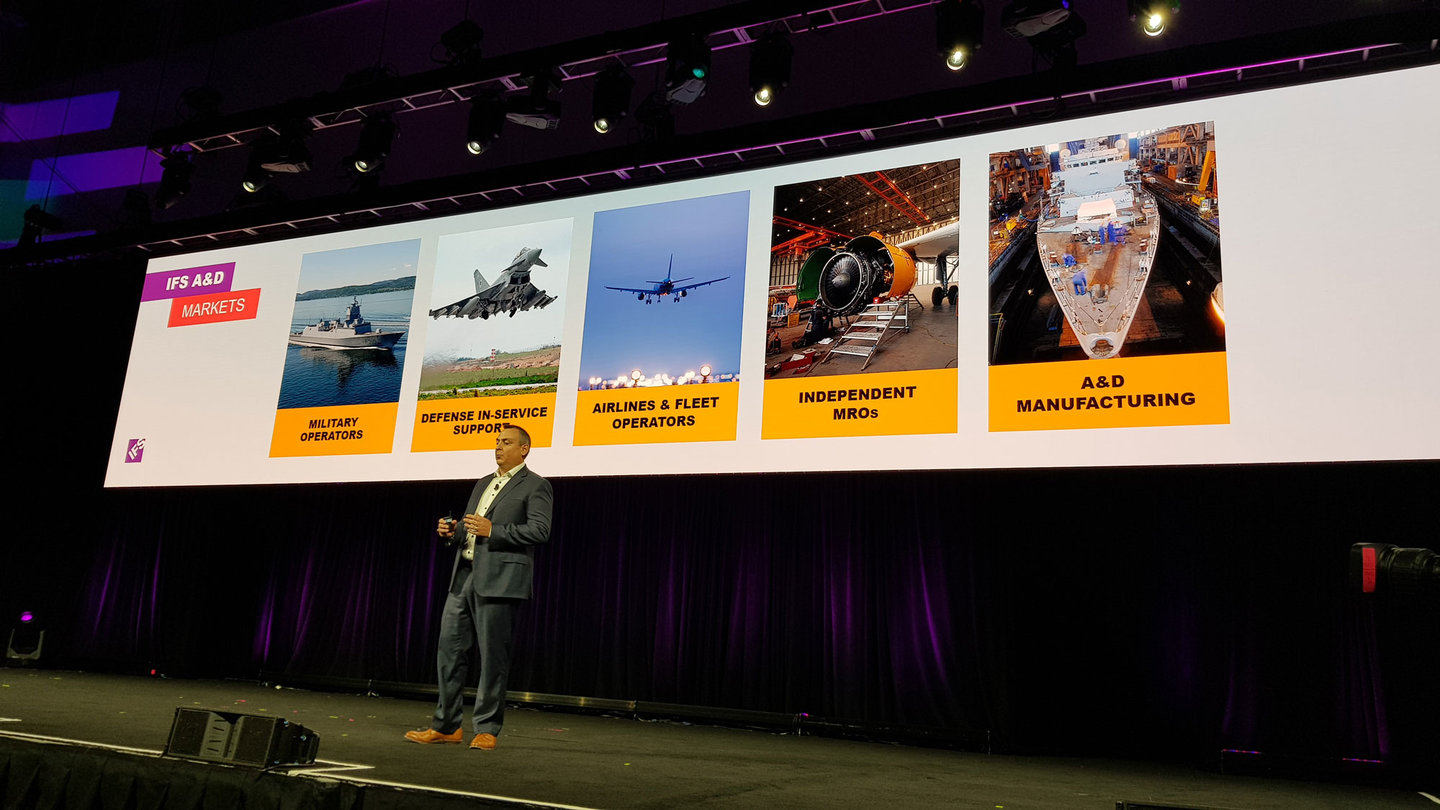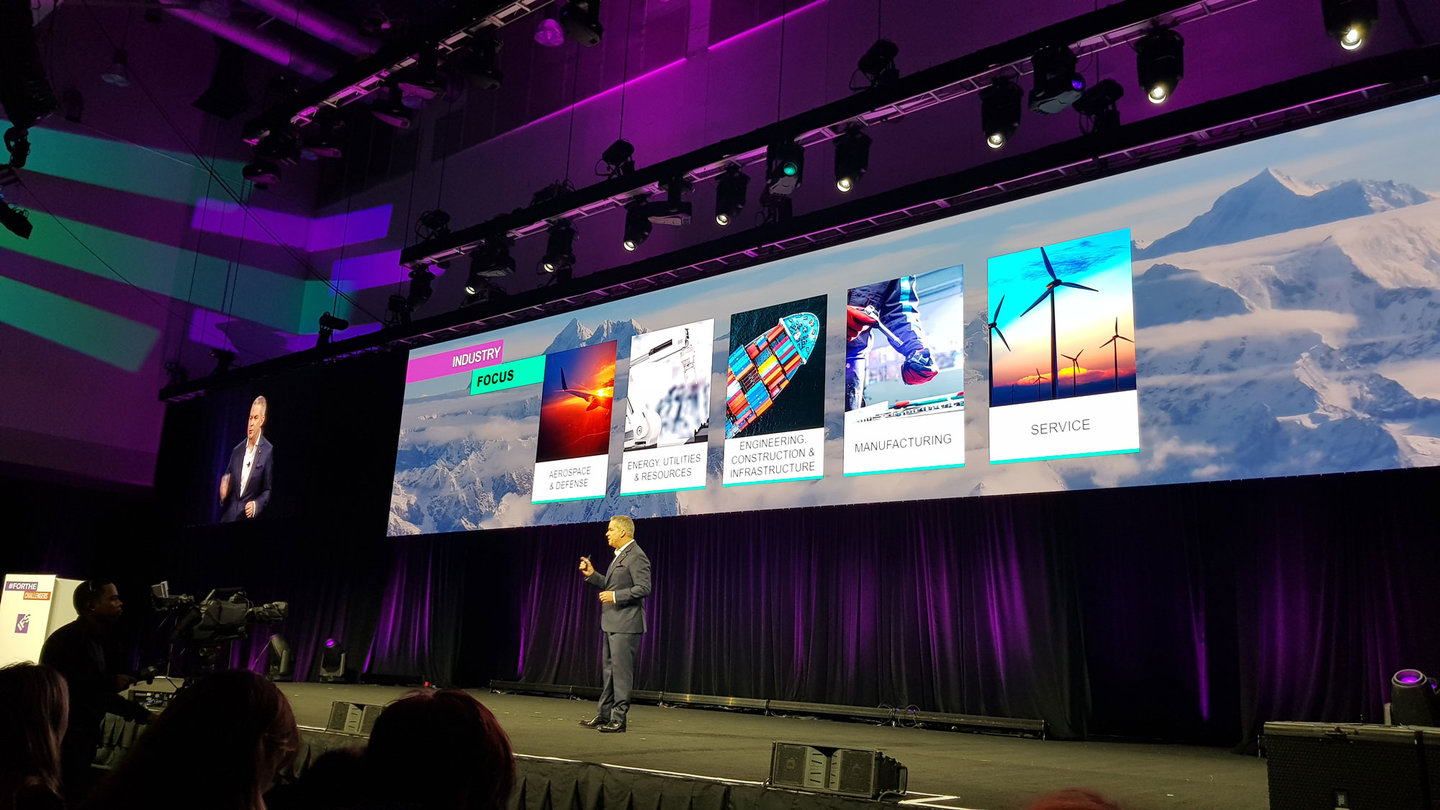EVENT | AIR
How IFS A&D supports some of defence’s biggest programmes
Berenice Baker reports from the IFS 2019 World Conference, where the company showcased how customers are using its enterprise resource planning tools to manage some of the world’s largest defence projects, including the Lockheed Martin F-35.

// Image courtesy of
The IFS 2019 World Conference in Boston in October was the biggest the company had ever held, with 40% more attendees than the previous year. Fittingly, its aerospace and defence (A&D) division showcased how customers are using IFS enterprise resource planning (ERP) software tools to manage and deliver through-life support for some of the world’s largest and most complex programmes, including the Lockheed Martin F-35.
At IFS’s last world conference 18 months ago, the enterprise resource planning company was in transition, having recently appointed Darren Roos as CEO and with the acquisition and integration of MXI Technologies, which forms a significant part of the company’s space and defence business today, underway. It heralded the creation of a global A&D organisation inside of what is otherwise a traditional regional corporate structure.
IFS Aerospace & Defence president Scott Helmer told us at this year's event: “We’re beginning to leverage the completion of that transformation to really drive our business globally across all of the sub-segments of A&D. We talk about aerospace and defence like it's an industry, but in fact you have a separate commercial and a defence industry. Our commercial business is very aviation-centric, but our defence business actually spans a range of aircraft, naval and land-based assets.”
Helmer identifies bringing the company’s capability to high-value programmes in those sub-segments as one of IFS’s greatest recent achievements.
“On the defence side, our partnerships are really starting to become more robust and come to life with companies like Lockheed Martin, where they're actually ISV-ing [independent software vendor] our capability into their programmes around MRO supply chain sustainment and logistics,” he explains.
“We’ve seen the same thing around AECOM management services, which has a branded solution around supply chain optimisation, transformation, procurement, streamlining using IFS technology. We've begun to pick up significant momentum and are positioning that capability in more and more programmes.
“Our customers are all IFS partners, especially the largest ones, which is a highly reputable market, of course. They partner around strategic direction and technology innovation.”
F-35 through-life support
One such partner is Lockheed Martin. The company’s business and technology development logistics information solutions manager, Mark Adams, delivered a breakout session giving an overview of how the company uses IFS tools for through-life support in its major programmes, including the F-35.
“Sitting out there you forget the complexity of the aircraft,” he said. “It's a modern fifth-gen aircraft with all kinds of capabilities, a lot that we can't even talk about in the room. So that's just the aircraft side; from the sustainment side, it's every bit as complex.”
Adams demonstrated the scale of the challenge by comparing the programme with carrying out an implementation for a single civilian customer, and the challenges that presents in taking care of all their needs and wants and the things they want to implement.
“We have the US Air Force as a customer, we have the navy as a customer and we have the Marine Corps as a customer, and then we have a handful of international partners who are our customers.” he said.
“The guys from the design programme office said ‘Thou shalt be one; one solution to support, maintain and sustain’. So if you're any one of those customers, everybody got a piece of what they really wanted, and a piece of what they didn't want, because it was kind of a group consensus. They all have a legacy system; they're all being forced to come to the new system. That was a challenge for our team to try and find that happy medium.”
“The logistics systems had to be ready to support the first aircraft off the line; when the first aircraft is ready for test, that system has to be ready to go.”
Lockheed Martin built IFS capability into its system that supports all of its F-35 supply chain soon after the contract was awarded, well before the first aircraft rolled off the production line.
“The logistics systems had to be ready to support the first aircraft off the line; when the first aircraft is ready for test, that system has to be ready to go,” Adams said. “But at that point the aircraft hadn't been built yet. So how do I add the logistics system with all the ties in to do it?
“By the way, this is circa 2005. So if it was an IT business, the way you would build the system today is not the same way it was built in 2005. If we were to do it all again, we would probably do something different, just like anything we're talking about and building today. If you were to roll the clock forward 15 years from now, it will be like, ‘why were they building those things like that?’ It doesn't make any sense.
“Meanwhile, aircraft are coming off the line every day, going to all the services in the United States as well as internationally. And we have to support those aircraft and they are flying combat missions today in multiple locations.”

IFS Aerospace & Defence president Scott Helmer speaking at the conference.
Supporting the defence move to globalisation
The local variants of F-35 tie into globalisation, one of the key themes for IFS identified by the company’s vice-president and industry director for aviation & defence, Graham Grose.
“The UK and US defence primes are moving out into the Middle East and Asia Pac,” he said. “We're putting key people into those regions because our whole mission in life, our raison d'etre, is to support regional.”
He added that the use of IFS products in programmes such as the F-35 demonstrates a push towards what is commercially called servitisation but is more commonly known as performance-based logistics in defence.
“That's nothing new, it's been around for 15, 20 years,” he said. “But it really does seem to be our biggest defence segment. So the stuff Lockheed's doing is effectively what we call defence and service support servitisation; they're taking our product forward into an MOD or DoD.”
Grose pointed out that another significant trend is for systems to work much more closely to the asset they are supporting through solutions such as the internet of things and health and usage monitoring. The fact IFS solutions can manage everything from this most granular of data to global programmes has driven their successful integration into some of the defence industry’s biggest projects.

IFS CEO Darren Roos speaking at the 2019 conference.